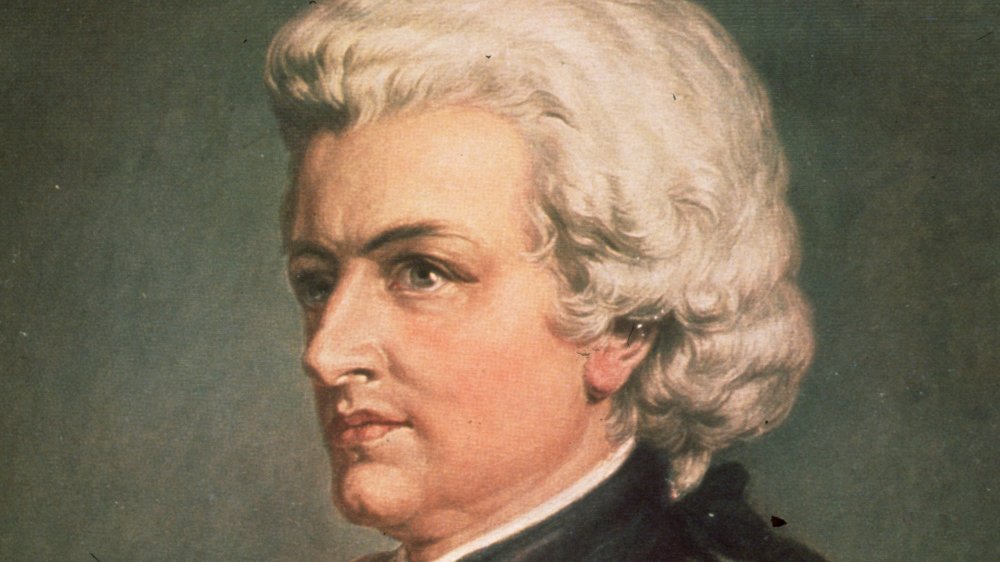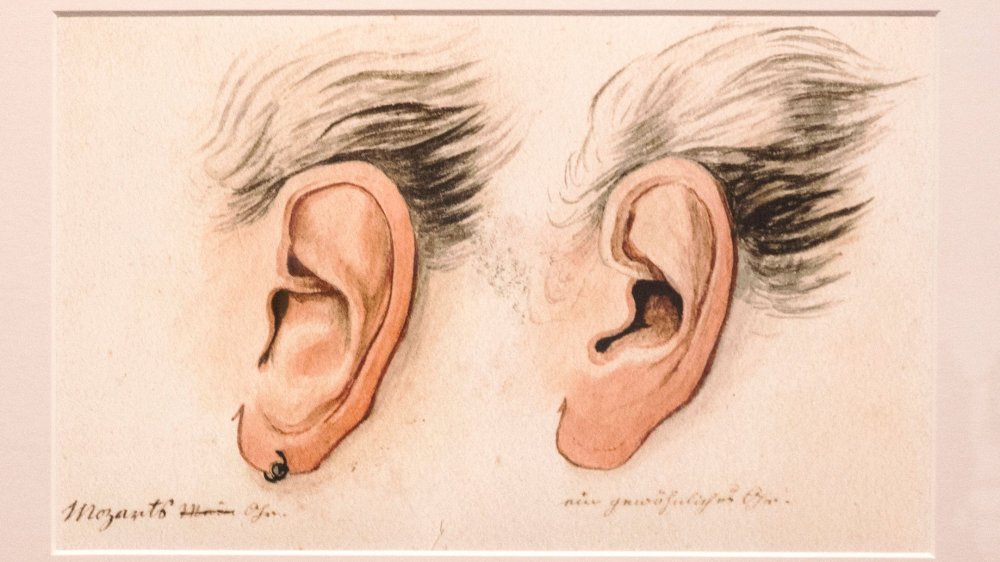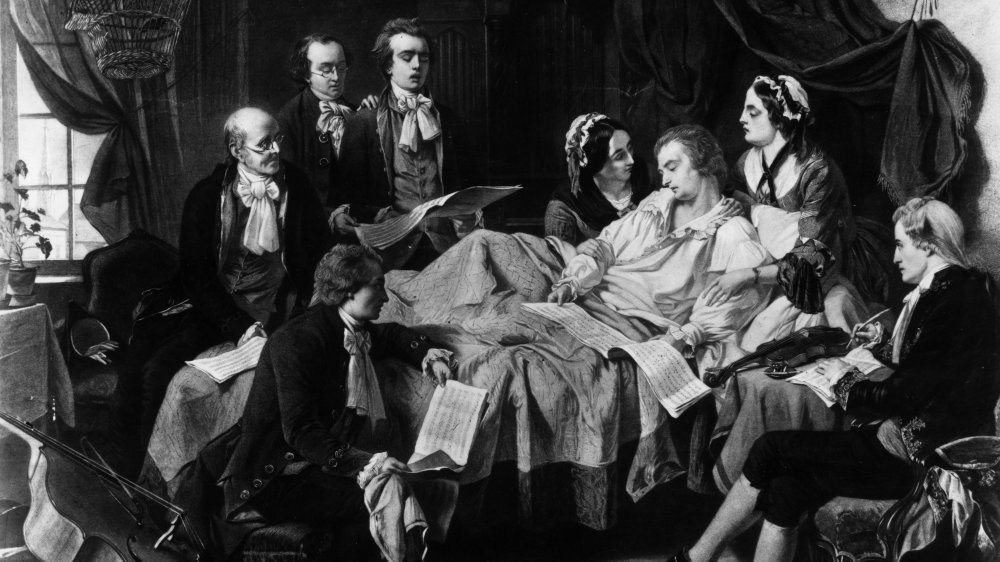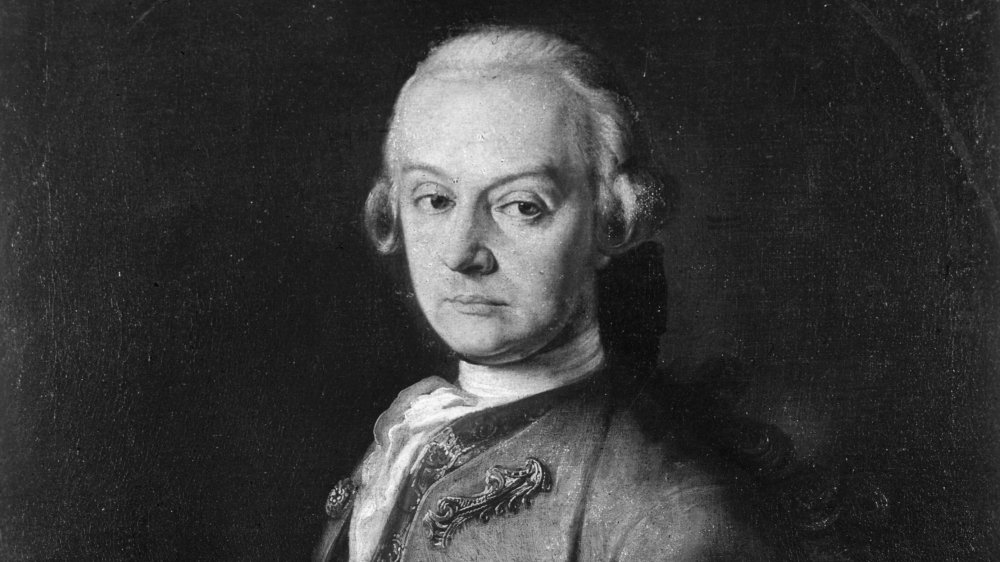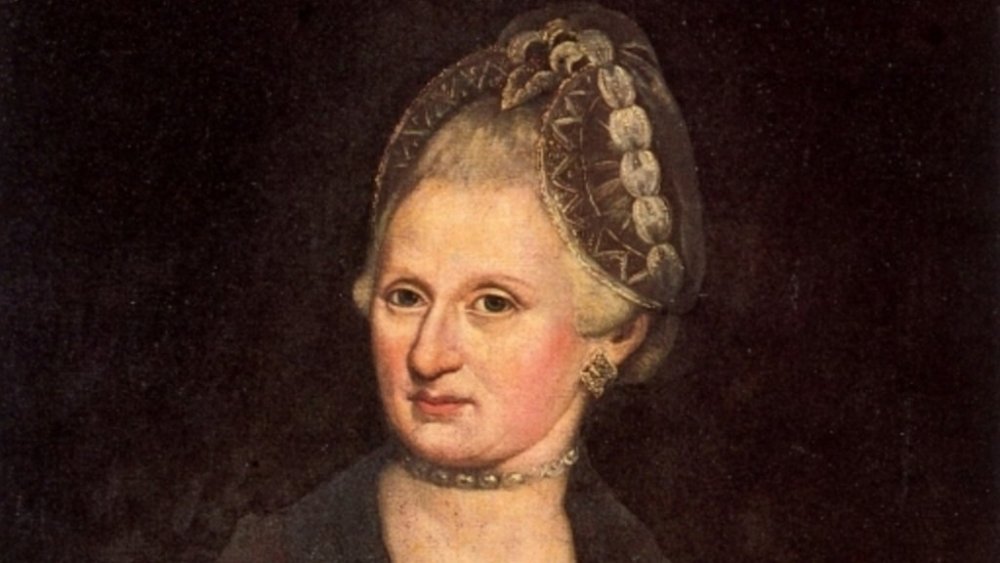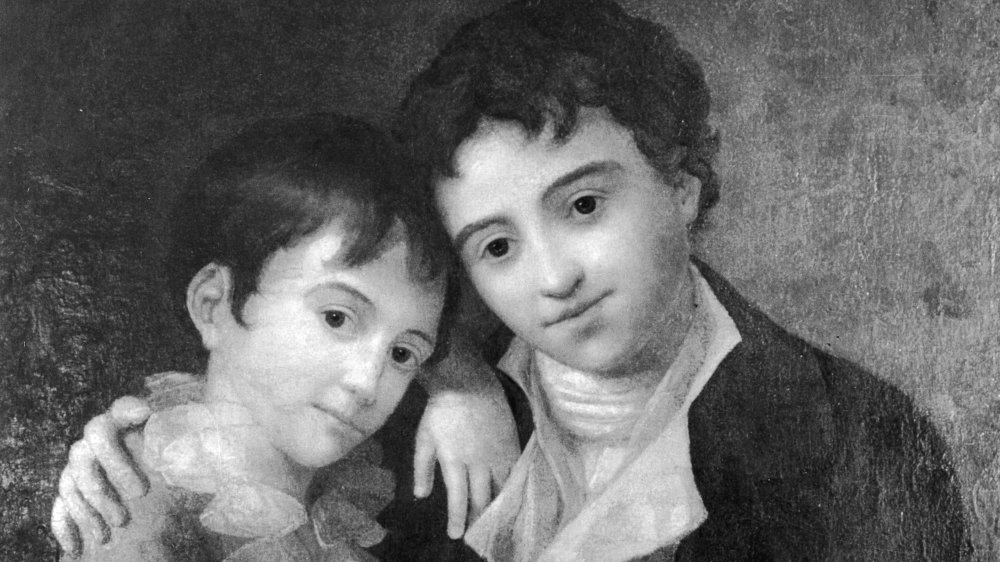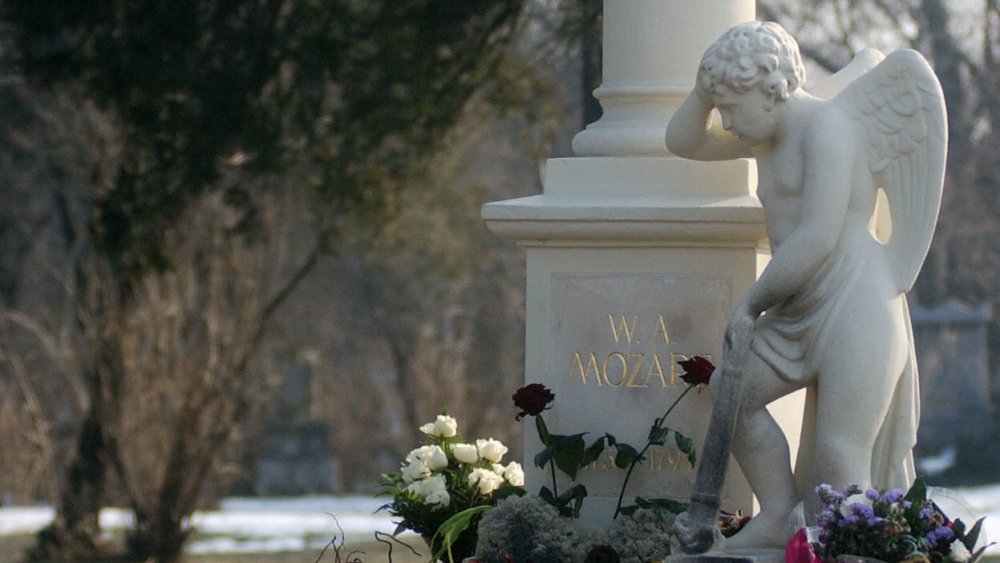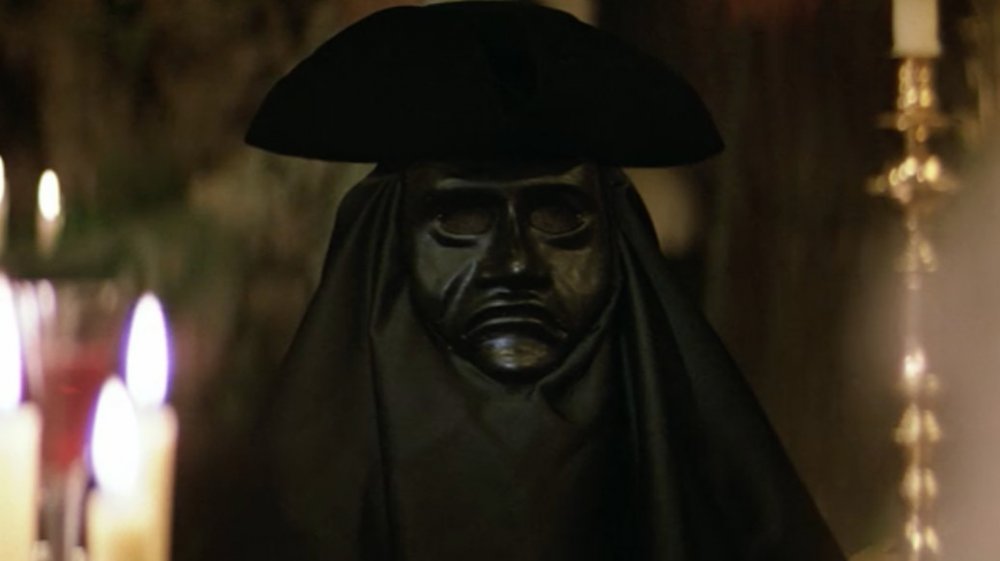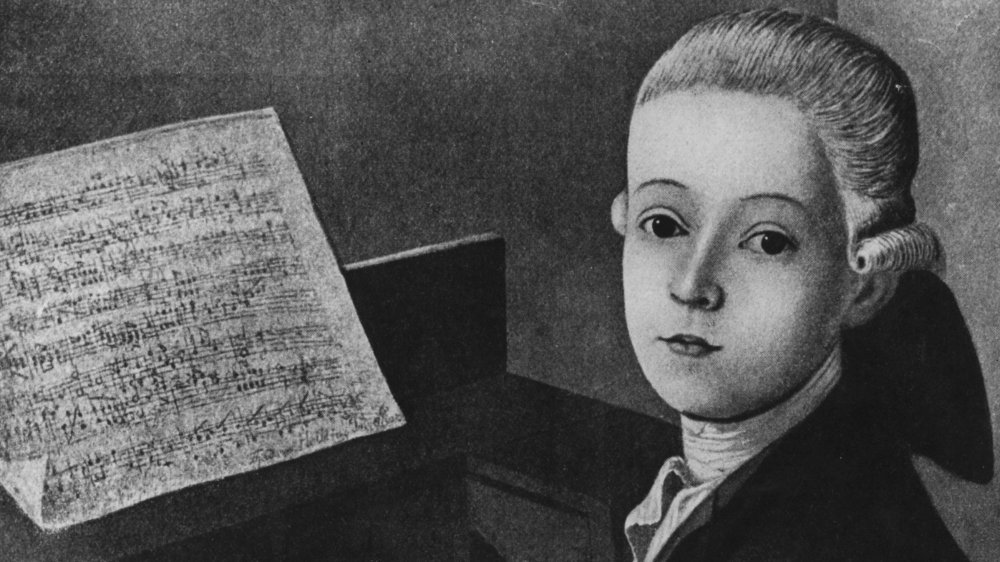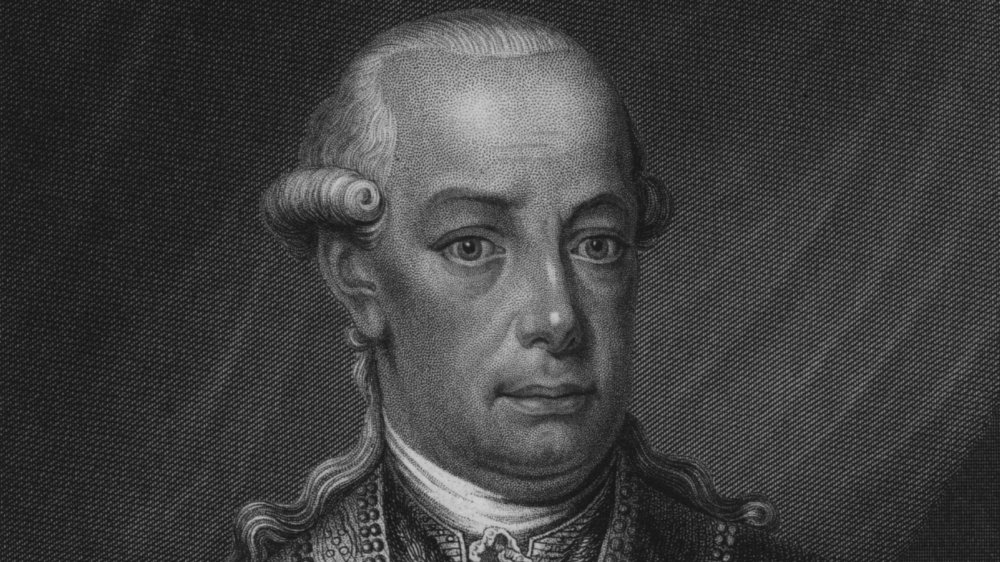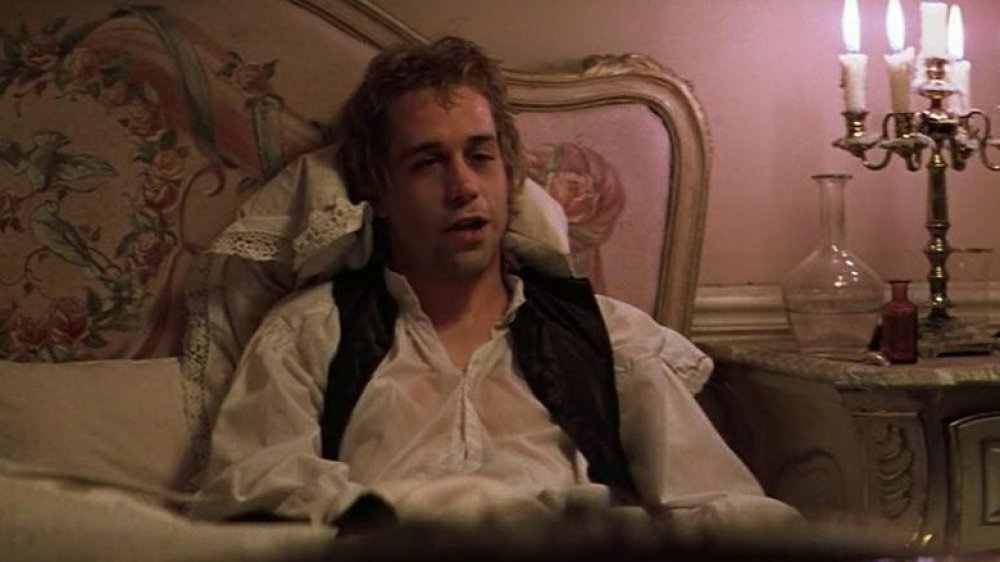The Tragic Real-Life Story Of Mozart
Considering how influential he was and how much music he produced — more than 600 individual pieces — it's shocking to learn that Wolfgang Amadeus Mozart lived to be just 35 years old. The music he produced is so beautiful and iconic that even people who would rather be tortured than listen to classical music are familiar with many of his works. But when it comes to the true story of Mozart's life, most of us think of the film Amadeus starring Tom Hulce and F. Murray Abraham or perhaps the Peter Shaffer play the film was adapted from — both of which are incredible pieces of entertainment that are also almost completely incorrect about the details of the real-life tragic story of Mozart and his early demise.
The truth is, Mozart was a genius with a gross, scatological sense of humor, a complete inability to handle money, and a life filled with tragedy, loss, and suffering right up to his dying moments. And he was a man who left behind some of the greatest music ever composed. Here are a few heartbreaking facts about him you might not know.
Mozart was considered deformed
Knowing what people who lived long before the advent of photography actually looked like is difficult. Portrait painters often idealized people's looks (hey, they were getting paid and were essentially the Instagram filters of their time), and all those fancy wigs and stiff poses detract from the verisimilitude of the image. But according to audiologist Robert M. Traynor, Ed.D., Mozart was likely born with an ear deformity that's commonly called "Mozart Ear" today, where the ear is larger and rounder than usual.
Traynor goes on to note that there's some evidence that this sort of congenital ear deformity is linked to congenital kidney problems, which might've explained Mozart's lifetime of ill health and early death, although diagnosing diseases from centuries-old portraits isn't exactly reliable. Regardless, it's pretty clear that Mozart wasn't considered a good-looking man. Dr. Vincent de Luise, an assistant clinical professor of ophthalmology at Yale University School of Medicine, notes that Mozart's "head was disproportionally large, his hands small, his nose large, his face pockmarked (from childhood smallpox), and his complexion pale." And according to Mozart's wife, he wore wigs long enough to cover his ears because he was aware of their odd appearance and was clearly sensitive about them. Portraits of Mozart bear this out. While they're unreliable, the person they depict is clearly not going to win any modeling contracts.
He was sick his whole life
Mozart's early death becomes much more understandable when you learn that he was almost continuously ill his entire life. In an article published in the Bulletin of the New York Academy of Medicine, Dr. Louis Carp laid out the litany of health issues the great composer suffered during his lifetime. He and his sister were likely malnourished as children because, for some reason, his family didn't believe in breastfeeding and actually gave their infants barley water instead, which probably left Mozart weak. He contracted scarlet fever as a child, which likely damaged his kidneys, leading to a lifetime of renal problems. A few years later he suffered through a bout of strep throat, then got smallpox when he was just 11 years old. Considering that smallpox was extremely lethal at the time, it's actually incredible he survived.
As an adult, he was almost constantly ill, suffering from toothaches and frequent fevers and exhaustion. In fact, in 1983, the Royal Society of Medicine published a paper detailing Mozart's many documented illnesses, including several respiratory infections, jaundice that might've been yellow fever (courtesy of a virus that still exists today), and frequent attacks of tonsillitis. His work habits didn't help, as he often worked himself into exhaustion, especially later in his life when financial worries drove him to accept multiple commissions at once, leaving him weak. He just wasn't a strong person, physically, and suffered his whole life as a result.
Mozart's father exploited him
Leopold Mozart was an accomplished musician himself, an in-demand violin teacher and professional violinist who published A Treatise on the Fundamental Principles of Violin Playing in 1756. According to music journalist James Reel, his Treatise was immensely popular and influential, although Leopold was a conservative player and composer who sneered at innovations and musical "tricks."
When Mozart (and his sister, Nannerl, who was probably at least as skilled as her brother) exhibited great talent at a young age, Leopold took the boy on a tour of Europe, playing up his status as a child prodigy and quickly making him into a sensation. Leopold was strict and often very harsh with his son, and according to Dr. Louis Carp, the endless touring and traveling through all kinds of weather likely hurt Mozart's already precarious health and denied him anything resembling a normal childhood.
Alex Ross, the music critic at The New Yorker, notes that Leopold is suspected of taking all of the money Mozart earned during his childhood career for himself, and in his biography of Mozart, author Maynard Solomon says that Leopold was described as a "rigid disciplinarian" who kept Mozart in "unconditional slavery" during this time. Leopold, unsurprisingly, had a huge influence over his son throughout his life.
His father blamed him for his mother's death
After a childhood spent touring Europe at his father's insistence, Mozart experienced something that's still happening to child stars today.
The moment he grew up, his star faded.
After dazzling the courts of Europe throughout his younger years, Mozart found himself no longer in demand as he became an adult. And when he began courting Aloysia Weber, his father Leopold and his mother Anna Maria objected to the match, so they killed two birds with one stone, sending young Mozart to Paris with instructions to infiltrate the wealthy society he would need to find gainful employment and to get him away from Aloysia. To ensure his good behavior, Anna Maria chaperoned him despite her delicate health. Both Mozart and his mother were miserable there, and Anna Maria took suddenly ill and died.
The shock of her death hit Mozart hard, but even worse was his father's reaction. Leopold had always told Mozart that his birth nearly killed Anna Maria, and according to author John Suchet, he flat-out blamed Mozart for her death. He wrote to Mozart, saying, "She was fated to sacrifice herself for her son," and he blamed her death on the fact that she had to travel to Paris in order to keep him away from Aloysia Weber. After this messy drama, Mozart proposed to Weber, but she turned him down, so he eventually married her sister, Constanze.
Only two of Mozart's six children survived infancy
If you've seen the movie Amadeus, then you know that Mozart's wife, Constanze, is often depicted as flighty and silly, and she's often described as "continuously pregnant." And that part actually isn't far from the truth. Mozart married Constanze on August 4, 1782. Ten months later, she had their first child, Raimund Leopold, who died just two months afterward.
As noted by The Guardian, over the next 12 years, she bore five more children: Karl Thomas, Johann Thomas Leopold, Theresia Constanzia, Anna Maria, and Franz Xaver. Of those five, only two — Karl and Franz — lived to adulthood. (Karl lived to be 74, but Franz only made it to 53.) Theresia lived seven months, the others a few weeks ... or less. The infant mortality rate in the 18th century was shockingly high. Philosopher Stephen Hicks notes it was probably over 50 percent, and Mozart himself saw five siblings die in their infancy, but that doesn't make losing so many children any easier. Shortly after Raimund passed away, Mozart wrote to his father, "Regarding our poor, big, fat, dear little boy, we are both really suffering."
Mozart truly mourned the death of his pet
As anyone who's ever kept and loved a pet knows, losing your companion can be a very painful experience, and the grief we feel for our pets is very real. As for Mozart, he had a very unusual pet — a starling. As Lyanda Lynn Haupt, author of Mozart's Starling, explains (via NPR), Mozart noted the purchase of the bird in a notebook in 1784, paying "a few kreuzers" for the creature, which he named Vogelstar. Legend has it that the bird spontaneously sang a few bars of one of Mozart's own compositions, prompting the composer to happily purchase the bird on the spot.
Haupt also notes that starlings — she keeps one herself — are terrible, terrible pets. In the wild, they steal nests from other birds and cause incredible amounts of agricultural damage. In a house, they can be aggressive, and they poop everywhere, which might be one reason Mozart loved Vogelstar since he enjoyed a good scatological joke more than anyone. When Vogelstar passed away three years later, Mozart was so bereft he actually organized a funeral for the bird, writing a touching poem as an epitaph for his pet and marking its final resting place with a small stone. Considering that Mozart opted not to attend his own father's funeral, it says something that he put so much effort into saying goodbye to his feathered friend.
He died penniless despite huge fame
Mozart was incredibly famous in his time. After his dazzling debut as a child prodigy, which saw him performing at royal courts all over Europe, his fame faded for a while. But his brilliance as a composer ensured that he was extremely famous when he died at the age of 35. He was also extremely broke despite his talent and fame. As Dr. Louis Carp notes, in his final years, Mozart resorted to pawning or selling most of his possessions and writing pathetic letters to friends, begging for loans.
There were many reasons for this, as Biography explains. For one, times were changing, and there were far fewer commissions and performances to be had. After all, Mozart lost one of his most powerful patrons when Holy Roman Emperor Joseph II died. And his successor, Leopold II, didn't like Mozart. Second, Mozart himself hated being trapped and pursued the life of a freelancer, meaning his income was unpredictable and subject to lengthy dry periods. And finally, the Mozarts knew how to party, and they lived extravagantly. Mozart dressed in expensive fashions and threw outrageously expensive parties. Put it all together, and you have the most famous composer of his time dying in debt and with nothing for his wife and children to survive on aside from exploiting his legacy.
He was buried in a common grave
George Bernard Shaw once jokingly said of Mozart, "Even his funeral was a failure." Despite his fame and contribution to world culture, Mozart was buried in a mass grave outside of Vienna. But this wasn't because he was poor (although he was definitely poor). Instead, it was because he wasn't an aristocrat, and the laws of the time forbade private burials for everyone except the nobility. These mass burials were common, and they were conducted with a fair amount of ceremony and dignity, but it's still shocking to think someone as talented and special as Mozart would simply be placed in an unmarked grave.
Worse, his remains were later exhumed from this mass gravesite and re-interred someplace, but we don't know exactly where, so his final resting place is unknown. As Dr. Louis Carp notes, there's a monument to Mozart in Vienna, erected in 1859 after some detective work identified a likely location for his remains. The city then later moved the monuments — but not the bodies — of several composers, including Mozart's, to another location, creating even more confusion.
The man who commissioned Mozart's final piece planned to steal it
If you've seen the film Amadeus, you might think that Mozart's famous unfinished "Requiem" was commissioned by a vengeful, angry Salieri as part of a complex gaslighting campaign to drive Mozart insane. That's likely not anywhere near the truth, although a mysterious man in a mask did appear at Mozart's apartments to commission the music. But according to Britannica, it was actually commissioned by Count Franz von Walsegg, who wanted the composition to honor the memory of his recently deceased wife, Anna.
Walsegg had a reputation for commissioning music from composers and then pretending that he'd written the piece himself, performing it in private, so it's likely this is what he intended for the "Requiem in D minor, K. 626" that Mozart never finished, which explains his disguise when setting it up. It's also possible that Mozart knew full well what was going on but needed the money so desperately he was willing to go along with the charade. As it turns out, it didn't matter. Mozart fell ill before he could finish the piece. He heard a private performance of what he'd written the day before he died, and his wife, Constanze, arranged to have it finished by a student based on Mozart's notes.
Mozart may have suffered from Tourette syndrome
Speculation about Mozart's health issues is pretty common. People analyze his portraits, his letters, and even his music for clues about his physical and mental states. It's not just his early death that makes him fascinating — it's also his behavior. Psychiatrists Joseph Jankovic and Aidin Ashoori note that Mozart was well-known for making scatological jokes and references constantly in both verbal and written communication, was known to make strange and inappropriate facial expressions (grimacing, repetitive movements), and exhibited what could be interpreted as signs of obsessive-compulsive disorder (OCD).
Dr. Ashoori and Dr. Jankovic say that all of these behaviors are also symptoms of Tourette syndrome, a condition marked by involuntary exclamations, usually of a vulgar or inappropriate nature, and movements. If Mozart did in fact suffer from Tourette's, he was likely a very high-functioning patient, able to either mask his symptoms as the unique behavior of a creative mind or to control it well enough so that it didn't impede his function in society.
His last opera was a failure
The Holy Roman Emperor Joseph II was one of Mozart's biggest patrons, so when he died in 1790, it wasn't good news for Mozart, who was already desperate for money. The new emperor, Leopold II, wasn't so fond of Mozart, in part because Mozart fraternized with Freemasons, but when the idea of commissioning an opera to commemorate the occasion of his coronation was floated, the first choice to write it was, ironically, Antonio Salieri. However, Mozart's jealous nemesis turned down the commission, and Mozart was the only man available.
Mozart couldn't afford to say no, and so he began work on La Clemenza di Tito. But according to The Telegraph, the event was a complete disaster. Attendees described it as "very boring" and "so bad that almost all of us went to sleep." The truly tragic aspect of this is that much of this is due to the performers and not the composition. One performer was described as singing "more with her hands than with her throat" and "a lunatic," which must've made it difficult to judge the music itself. In fact, by the early 1800s, the opera was being performed to acclaim, and it's now considered a classic. But Mozart died believing it was a complete failure.
Mozart's death was probably excruciating
The idea that Mozart was poisoned, possibly by a jealous Antonio Salieri, didn't come out of nowhere. In fact, it came from Mozart himself. His final days were horrible. Mozart was paranoid and very sick, and he came to believe he was being poisoned. However, The Guardian reports that when he came out of his fevers, he would retract the accusations.
What's definitely true is that Mozart suffered terribly in his final moments. The New York Times notes that people at his bedside described him as "very swollen, so much so that he was unable to turn in bed," with a high fever that sent him into paranoid delusions. In a report published in The Annals of Internal Medicine, Dr. Richard H. C. Zegers examined the symptoms reported by witnesses — edema, malaise, back pain, and rash — are all symptoms of a streptococcal infection, and the swelling could've been the result of a disease commonly associated with strep, glomerulonephritis. So Mozart was almost certainly not poisoned, but he definitely died in agony at a time when medicine wasn't very effective and often did more harm than good.
